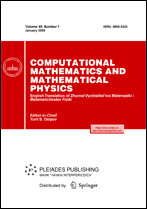|
This article is cited in 6 scientific papers (total in 6 papers)
Stable iterative Lagrange principle in convex programming as a tool for solving unstable problems
F. A. Kuterin, M. I. Sumin
Nizhny Novgorod State University, Nizhny Novgorod, Russia
Abstract:
A convex programming problem in a Hilbert space with an operator equality constraint and a finite number of functional inequality constraints is considered. All constraints involve parameters. The close relation of the instability of this problem and, hence, the instability of the classical Lagrange principle for it to its regularity properties and the subdifferentiability of the value function in the problem is discussed. An iterative nondifferential Lagrange principle with a stopping rule is proved for the indicated problem. The principle is stable with respect to errors in the initial data and covers the normal, regular, and abnormal cases of the problem and the case where the classical Lagrange principle does not hold. The possibility of using the stable sequential Lagrange principle for directly solving unstable optimization problems is discussed. The capabilities of this principle are illustrated by numerically solving the classical ill-posed problem of finding the normal solution of a Fredholm integral equation of the first kind.
Key words:
convex programming, instability, sequential optimization, iterative dual regularization, regularized Lagrange principle in iterative form, unstable problems, Fredholm integral equation of first kind.
Received: 03.02.2016
Citation:
F. A. Kuterin, M. I. Sumin, “Stable iterative Lagrange principle in convex programming as a tool for solving unstable problems”, Zh. Vychisl. Mat. Mat. Fiz., 57:1 (2017), 55–68; Comput. Math. Math. Phys., 57:1 (2017), 71–82
Linking options:
https://www.mathnet.ru/eng/zvmmf10507 https://www.mathnet.ru/eng/zvmmf/v57/i1/p55
|


|





 Contact us:
Contact us: Terms of Use
Terms of Use
 Registration to the website
Registration to the website Logotypes
Logotypes








 Citation in format
Citation in format 
